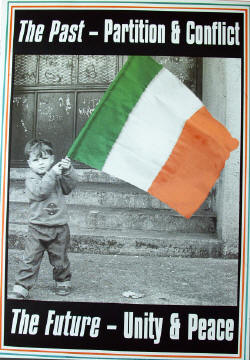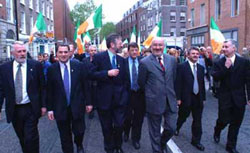 |
Irisch
Republikanische Solidarität
|
 |
NO MORE EXCUSES
The Irish peace process is expected to move rapidly over the
next twelve months following a unilateral move by the
Provisional IRA to stand down and disarm.
A renewed effort is to be made by the Dublin and London
governments to finally implement the long-delayed 1998 Good
Friday Agreement.
Thursday saw unprecedented media attention on the IRA statement,
which was unambiguous and conclusive. Ordering an end to its
armed campaign, the IRA "compelled" all members to dump arms,
operate by purely peaceful and democratic means and not "engage
in any other activities whatsoever".
The directness of the statement comes amid a new push to
convince both unionists and nationalists that conflict and
violence are at an end. Going far beyond the terms of the Good
Friday Agreement, it will ensure pressure on the two governments
and unionists to deliver on their end of the deal.
The first steps in a confidence-building process have already
begun, with the announcement that three British military
installations in the border area of South Armagh are to be
removed.
Reports also indicate that the IRA is already in the process of
decommissioning its remaining stocks of arms. The process is to
be verified by General John de Chastelain's Decommissioning
Commission and Protestant and Catholic clergy. The IRA statement
made no reference to unionist demands for 'humiliation'
photographs of the event.
British Direct Ruler Peter Hain said the statement fulfils his
governments' demands for what Tony Blair called 'acts of
completion', and would move to implement a number of elements of
the Good Friday Agreement set out in its Joint Declaration two
years ago.
"For its part the British government accepts that the IRA
statement is intended to express acts of completion," he said.
"On that basis, the Government will implement those areas of the
Joint Declaration of 2003 which were dependent on this
long-awaited decision by the IRA."
He said legislation would be introduced this autumn to resolve
the outstanding issue of IRA Volunteers 'on the run' from
outstanding conflict-related prosecutions. He also promised to
publish an updated version of the the British government's
demilitarisation programme.
Over the next six months, the British government's IMC body,
which monitors paramilitary groups, is to verify that the IRA
has ended its armed struggle.
Confirming that the Independent Monitoring Commission would
produce a report in January, Mr Hain said the IRA's decision was
"an historic turning point", but added: Nevertheless, the way
that the conflict has played out in Northern Ireland means that
there will be some caution".
The IMC report is widely expected to be positive and is should
ease the way for unionist hardliners to take part in a
power-sharing government in the North.
Questions remain, however, over the intention of unionist
paramilitaries, who never maintained a declared ceasefire.
Dissident republicans could be also boosted by any move by Sinn
Fein to give support to the PSNI police, an issue which is far
from resolved.
In Dublin, Sinn Fein leader Gerry Adams said IRA members and
Republicans must "stay united".
"Some people may never come to terms with it. Maybe it is a step
too far for some Republicans," he said.
The Dublin government has said it hopes Thursday's statement
marked the beginning of a "transformation" process where the
current order outlawing the Provisional IRA could be dropped.
The group has not disbanded, and is expected to continue as a
peaceful, unarmed organisation.
However, Mr Adams also seemed to rule the possibility of the
Costlier Four being released. Asked about the matter on Friday,
he said the men had already courageously removed themselves from
the equation, despite clearly qualifying for early release under
the Good Friday Agreement.
Letzte Änderung:
01-Aug-05